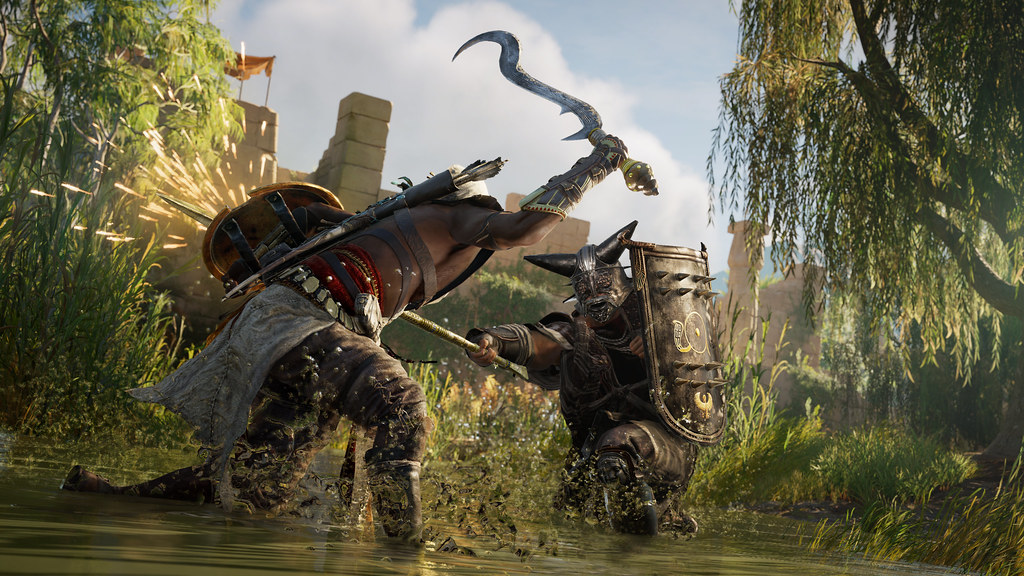
The newest entry in the landmark Assassin's Creed series launches October 27 on PS4.
The arrival of Assassin’s Creed Origins on October 27 will mark a significant milestone for the series. Not only will the game explore an intriguing new era of history and tell the story of how the Assassin Brotherhood was formed, it will also release almost 10 years to the day after the first Assassin’s Creed launched. In the decade since the series’ inception, Assassin’s Creed games have sold hundreds of millions of copies and changed people’s lives, not least of whom are the developers who worked to bring each game to life. One of the developers that has been with the series since the first game is Jean Guesdon, the Creative Director of Assassin’s Creed Origins. We talked to Guesdon about what it was like to work on that first title, how the series has grown over time, and why now is the right time to take players to Ancient Egypt.
For a series steeped in history, Assassin’s Creed didn’t exactly get started in the most iconic time period. Reflecting on the first game’s setting of the Levant during the Third Crusade in 1191, Guesdon says, “Who knew about this time period back in the day? Not a lot of people, for sure. But despite that, the angle was to ground the series in the real history. This is really important, this is where we’re coming from, from a place where there were no dragons, but that was incredibly fascinating nonetheless.”
Players were fascinated, all right, and over the next year and a half, Assassin’s Creed went on to sell 8 million copies worldwide. A franchise had been launched on the strength of the core vision for the game: “total freedom of movement in a beautiful open world, set in an exotic time period, grounded in human history, with a strong mysterious narrative.” Guesdon’s description certainly captures the essence of the series, but there’s another important element he believes was crucial to the game’s success.
“I also think that Desmond’s story played a big role,” he says. “This small layer (when compared to the global experience set in the past) really created a sense of continuity that made people wonder about ‘the next episode.’ This was the glue that stitched different time periods and heroes together in a consistent and coherent universe.”
That universe continued to grow with Assassin’s Creed II and its Renaissance-era sequels, and with it, an increasingly passionate community who expressed their love for the series across a wide variety of artistic and social endeavors. From character portraits and cosplay outfits to fan club meet-ups and parkour videos, Assassin’s Creed brought people together from across all walks of life, and it’s something Guesdon has thought a lot about.
“I really think that the power of the community and the attachment of the audience come from the positive values of the series,” he says. “Assassin’s Creed is not a competitive franchise, it’s more a collaborative universe. A real Brotherhood is very inclusive and respectful. Assassins fight for free will and for the people, all the people. This is a very positive message. And the community is based on that.”
Seeing the success of the series and the impact it has had on the gaming community, it’s hard not to wonder whether Guesdon and the team saw it all coming when they were working on that first game those many years ago.
“We could feel that Assassin’s Creed was ‘special,’” remembers Guesdon. “Internally, like externally, there was a kind of ‘aura’ around the game. Something that was screaming, ‘I’m not a normal videogame! I’m special!’ Of course, nobody could have predicted that, 10 years later, our universe would have become what it is now, but the feeling that we were creating something huge, even if not fully understood, was definitely there.”
So what about today’s team? As they prepare to launch Assassin’s Creed Origins and send players back to the earliest historical setting for an AC game yet, the team is gearing up to put players back in touch with the “strong mysterious narrative” Guesdon cited as core to the series’ appeal.
“With Assassin’s Creed Origins, we really wanted to come back for the 10th anniversary of the series with something that would be a true milestone for the franchise,” says Guesdon. “And what better story to tell in Ancient Egypt, cradle of modern civilization, than the one clarifying the origins of the Brotherhood as we’ve known it since Assassin’s Creed?”
Of course, narrative isn’t their only focus. The other pillars of the franchise — the historical setting, the immersive world, the engaging combat — are still a priority for the team, but they’ve also set their sights on making this “a major step in the evolution of the franchise, in terms of gameplay experience.” With a new combat system, a new quest structure, and a new AI framework, the team poured their efforts into “new stuff that would push [them] to give more control to players over their personal experience.”
After all, playing an Assassin’s Creed game is a very personal experience; we each follow our own paths, use our own tactics, and identify with the characters in our own ways. So too has developing Assassin’s Creed games been a very personal experience for Guesdon, and he feels “incredibly lucky” to have been a part of what is, in his words, “a fantastic human adventure. One that I share with all my fellow colleagues that created this amazing universe with their passion and hard work, but also one that I share with our amazing community. We’ve always been there for each other and I hope it will continue for a long time.”
Assassin’s Creed Origins is coming October 27 for PlayStation 4.












Comments are closed.
11 Comments
Loading More Comments